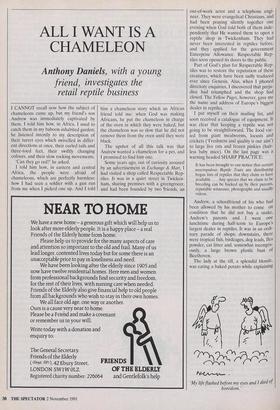ALL I WANT IS A CHAMELEON
Anthony Daniels, with a young
friend, investigates the retail reptile business
I CANNOT recall now how the subject of chameleons came up, but my friend's son Andrew was immediately captivated by them. I told him how, in Africa, I used to catch them in my baboon-inhabited garden; he listened intently to my description of their turret eyes which swivelled in differ- ent directions at once, their curled tails and three-toed feet, their swiftly changing colours, and their slow rocking movements.
'Can they go red?' he asked.
I told him how, in eastern and central Africa, the people were afraid of chameleons, which are perfectly harmless: how I had seen a soldier with a gun run from me when I picked one up. And I told him a chameleon story which an African friend told me: when God was making Africans, he put the chameleon in charge of the oven in which they were baked, but the chameleon was so slow that he did not remove them from the oven until they were black.
The upshot of all this talk was that Andrew wanted a chameleon for a pet, and 1 promised to find him one.
Some years ago, out of curiosity aroused by an advertisement in Exchange & Mart, I had visited a shop called Respectable Rep- tiles. It was in a quiet street in Twicken- ham, sharing premises with a greengrocer, and had been founded by two 'friends, an out-of-work actor and a telephone engi- neer. They were evangelical Christians, and had been praying silently together one evening when God told both of them inde- pendently that He wanted them to open a reptile shop in Twickenham. They had never been interested in reptiles before, and they applied for the government Enterprise Allowance. Respectable Rep- tiles soon opened its doors to the public.
Part of God's plan for Respectable Rep- tiles was to restore the reputation of these creatures, which have been sadly traduced ever since Genesis. Alas, when I phoned directory enquiries, I discovered that preju- dice had triumphed and the shop had closed. The Yellow Pages, however, gave me the name and address of Europe's biggest dealer in reptiles.
I put myself on their mailing list, and soon received a catalogue of equipment. It was clear that keeping a reptile was not going to be straightforward. The food var- ied from giant mealworms, locusts and crickets ('Freshness and quality is our aim') to large live rats and frozen pinkies (hair- less baby mice). On the last page was a warning headed SHARP PRACTICE: It has been brought to our notice that certain unscrupulous Reptile Touts are distributing bogus lists of reptiles that they claim to have available . . . Any species that we claim to be breeding can be backed up by their parents, reputable witnesses, photographs and usually videos.
Andrew, a schoolfriend of his who had been allowed by his mother to come on condition that he did not buy a snake, Andrew's parents and I went one lunchtime during half-term to Europe's largest dealer in reptiles. It was in an ordi- nary parade of shops; downstairs, there were tropical fish, birdcages, dog leads, flea powder, cat litter and, somewhat incongru- ously, a large brown plastic bust of Beethoven.
The lady at the till, a splendid blonde, was eating a baked potato while explaining 'My life flashed before my eyes and 1 died of boredom.' to a couple of punkish herpetological neo- phytes how they should feed frozen mice they had just bought to their snake. 'After you've thawed them out,' she said, You hold them at the end of your snake tweezers and wave them about to make the snake think they're alive. I suppose I Should sell you some tweezers, but they cost twelve pound, and a stick's just as good.'
The reptiles were upstairs, in a large heated room. As well as snakes and lizards, there were glossy black scorpions, frogs of many colours and salamanders. What boy could enter this enchanted world without becoming enraptured? Andrew's parents and I, middle-aged as I suppose we must now confess ourselves, were enraptured too: here was the wonder and beauty of creation in concentrated form.
There was something special about the three men who worked among the reptiles. One of them, the youngest, was heavily tat- tooed, and was dressed in the aggressively ugly clothes which the young seem to favour; in other circumstances I might have dismissed him as a lout. But all three men worked in a way that one so rarely sees in England: with evident love for what they were doing.
The owner — a very learned man took much time to explain everything to us. Chameleons, he said, were difficult to keep; they needed to be hand-watered and even experienced keepers often lost them. He suggested that we started with a leop- ard gecko, easy and unfastidious in their habits. They ate either crickets or locusts, though he suggested locusts, since crickets sometimes escaped and chirrupped some- where in the room at three o'clock in the morning for six months on end, which drove owners to distraction (so much for a cricket on the hearth). As for supplies of crickets and locusts, they were easily main- tained: we could arrange for a standing order to be sent through the post. It occurred to me that a visit to a commercial locust-breeder might be not without inter-
est.
Fortunately, Andrew liked the leopard gecko best of all (I coveted the dazzlingly green Chinese water dragon, Physignathus cocincinus). The geckos, whose spots really a. re like a leopard's, are now bred in captiv- ity; and the owner told us proudly that last Year he had bred 3,000 snakes, more than all the zoos in England put together. • In only a couple of hours, then, we had Joined the 15,000 people in Britain who keep reptiles, whom previously I had sup- Posed to be bizarre, a collection of psy- chopaths and social inadequates. Andrew's !pother — upon whom the burden of care or Leo the leopard gecko has principally ,alien — has learnt very quickly how to dip locusts in vitamin supplement and pinch th.eir hind legs to prevent them from hop- Ping out of Leo's reach. As for Andrew, the foeauty of life has distracted him completely mcnn computer games.



































































 Previous page
Previous page